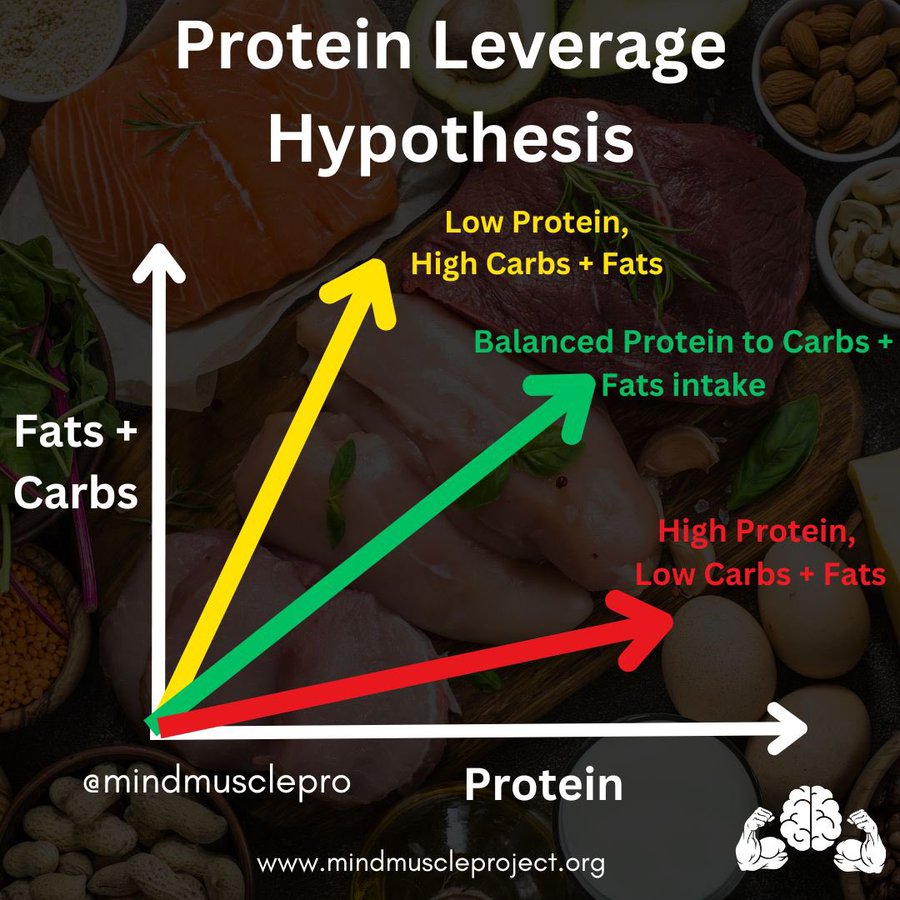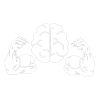The Protein Leverage Hypothesis proposes:
- The body regulates overall food intake to meet a specific protein target.
- If your diet is low in protein, your body will continue to crave food, driving you to consume more calories in the form of carbs and fats until your protein needs are met.
In simpler terms:
✅ Protein satisfies hunger: A diet rich in protein reduces cravings and promotes satiety.
❌ Low-protein diets drive overeating: Diets high in processed foods (low in protein) leave you hungrier, causing you to overeat calories from carbs and fats.
How It Works: Protein and Hunger Regulation #
Your body has a built-in mechanism to prioritize protein intake because it is essential for survival. Here’s how it plays out:
- Low Protein = More Hunger
- When protein intake is insufficient, your body keeps signaling hunger.
- This leads to overeating of foods that are typically high in calories but low in protein—like processed snacks, sugary treats, and refined carbs.
- High Protein = Satiety
- Protein-rich foods trigger satiety hormones (like peptide YY and GLP-1), which make you feel full and satisfied faster.
- When your body gets enough protein, your cravings for additional food naturally decrease.
- Processed Foods and Overeating
- Most processed foods are low in protein and high in refined carbs and unhealthy fats.
- These foods fail to satisfy the body’s protein needs, causing you to feel hungry again shortly after eating, leading to a cycle of overeating.
Example: Compare eating a bowl of sugary cereal (low in protein) with a plate of eggs and vegetables (high in protein). The cereal might satisfy you temporarily, but you’ll feel hungry again within an hour. Meanwhile, the protein-rich meal will keep you fuller for longer.
Why Is Protein So Important? #
Protein is the building block of life and the most critical macronutrient for:
- Building and repairing tissues.
- Maintaining muscle mass.
- Supporting hormone and enzyme production.
- Regulating immune function.
Without adequate protein, the body cannot perform these functions efficiently, leading to poor health outcomes like muscle loss, fatigue, and metabolic imbalances.
Implications of the Protein Leverage Hypothesis #
The theory suggests that overeating is essentially a symptom of a low-protein diet. Here’s why:
- Low Protein Diets = Higher Calorie Intake
- When your diet lacks protein, your body compensates by consuming more total calories from fats and carbs.
- This explains why diets rich in ultra-processed, low-protein foods often lead to weight gain and obesity.
- Protein-Rich Diets Reduce Hunger
- By prioritizing protein, you can naturally reduce your calorie intake without feeling deprived.
- Protein-rich diets improve satiety, help regulate hunger hormones, and make it easier to manage your weight.

Shortcomings of the Protein Leverage Hypothesis #
While the theory has strong evidence to support it, it is not without its limitations:
- Individual Variability: Protein needs vary from person to person based on age, gender, activity level, and metabolic health.
- Other Factors: Hunger and overeating are influenced by many factors, including stress, sleep quality, and nutrient deficiencies—not just protein intake.
- Diet Quality: Consuming excessive protein from unhealthy sources (like processed meats) can have its own health risks.
Takeaway: Prioritize Protein for Better Health #
While the Protein Leverage Hypothesis might not explain every aspect of overeating, it highlights a crucial truth:
✅ Protein is the most satiating macronutrient.
✅ Low-protein diets often lead to overeating, weight gain, and poor health outcomes.
Here’s how to apply this principle in your daily life:
- Include protein in every meal: Eggs, meat, fish, dairy, and legumes are excellent options.
- Limit processed, low-protein foods: Avoid sugary snacks, refined grains, and junk food that lack nutritional value.
- Find your protein target: Most people need 0.8–1.2 grams of protein per kilogram of body weight, but this can vary based on your goals (e.g., fat loss, muscle gain).
Final Thoughts #
The Protein Leverage Hypothesis reminds us that the quality of the food we eat matters more than just the calories. By prioritizing protein in your diet, you can reduce hunger, avoid overeating, and support your overall health.
If you’re struggling with constant cravings or overeating, take a look at your protein intake—it might just be the missing piece of the puzzle.




